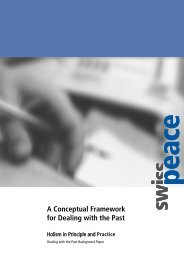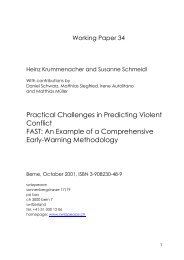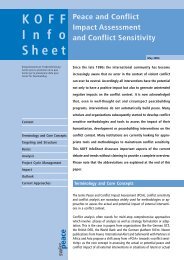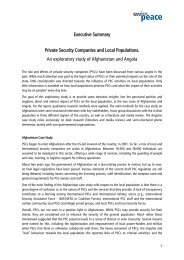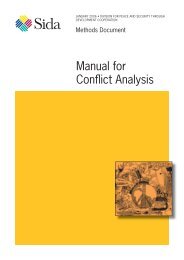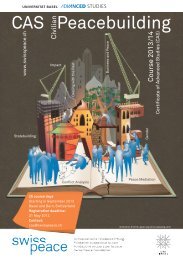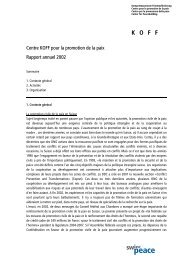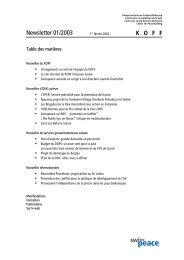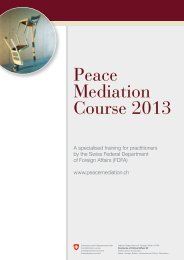Unpacking the Mystery of Mediation in African Peace ... - Swisspeace
Unpacking the Mystery of Mediation in African Peace ... - Swisspeace
Unpacking the Mystery of Mediation in African Peace ... - Swisspeace
Create successful ePaper yourself
Turn your PDF publications into a flip-book with our unique Google optimized e-Paper software.
Somalia, Khartoum Negotiations 2006<br />
people, on <strong>the</strong> o<strong>the</strong>r hand, were less optimistic.<br />
Many saw <strong>the</strong> agreement as a ploy to attract<br />
funds from oil-rich AL states; o<strong>the</strong>rs believed that<br />
<strong>the</strong> deal was signed to please <strong>the</strong> host country,<br />
Sudan. 195<br />
Context<br />
Increas<strong>in</strong>gly radical policies with<strong>in</strong> <strong>the</strong> SCIC,<br />
such as calls for jihad aga<strong>in</strong>st Ethiopia and recruitment<br />
<strong>of</strong> foreign fighters, set <strong>in</strong> motion a confrontation<br />
with <strong>the</strong> <strong>in</strong>creas<strong>in</strong>gly weaken<strong>in</strong>g and<br />
wi<strong>the</strong>r<strong>in</strong>g government and, more importantly,<br />
with Ethiopia, which already had battle-ready<br />
troops <strong>in</strong>side Somalia. In December 2006, <strong>the</strong><br />
SCIC was ousted from power <strong>in</strong> an <strong>of</strong>fensive<br />
launched by Ethiopian forces. The TFG entered<br />
Mogadishu to try and govern from <strong>the</strong> capital,<br />
while a counter-<strong>in</strong>surgency was launched by remnants<br />
from <strong>the</strong> SCIC to target Ethiopian and<br />
government troops.<br />
Process and Participation<br />
Despite <strong>the</strong> high-level participation from <strong>the</strong> government<br />
and <strong>the</strong> symbolic value <strong>of</strong> <strong>the</strong> AL’s engagement<br />
<strong>in</strong> <strong>the</strong> conflict – <strong>the</strong>reby symbolically<br />
form<strong>in</strong>g a “Muslim bond’ <strong>in</strong> <strong>the</strong> eyes <strong>of</strong> <strong>the</strong> SCIC<br />
– several factors comb<strong>in</strong>ed resulted <strong>in</strong> <strong>the</strong> failure<br />
<strong>of</strong> <strong>the</strong> Khartoum talks. Most importantly, <strong>the</strong><br />
will<strong>in</strong>gness <strong>of</strong> <strong>the</strong> parties to participate <strong>in</strong> a political<br />
dialog and reach a settlement was only attributed<br />
to <strong>the</strong> moderate group with<strong>in</strong> <strong>the</strong> Islamic<br />
courts; it did not <strong>in</strong>clude <strong>the</strong> radical and militant<br />
leader and members, who supported nei<strong>the</strong>r <strong>the</strong><br />
dialog nor <strong>the</strong> deals brokered with <strong>the</strong> TFG.<br />
Partly, <strong>the</strong> parties came to <strong>the</strong> table due to concerns<br />
about face-sav<strong>in</strong>g and tactical reflections,<br />
ra<strong>the</strong>r than be<strong>in</strong>g prepared for a long-term peace<br />
process. However, this is a typical state <strong>of</strong> affairs<br />
at <strong>the</strong> onset <strong>of</strong> negotiations. External developments,<br />
e.g., Ethiopian military operations, prevented<br />
this tactical phase from develop<strong>in</strong>g <strong>in</strong>to a<br />
more solid process. As it turned out, ra<strong>the</strong>r than<br />
be<strong>in</strong>g a prelude to peace and reconciliation, <strong>the</strong><br />
talks between <strong>the</strong> parties <strong>in</strong> Sudan were a mere<br />
<strong>in</strong>terlude between fierce fight<strong>in</strong>g and competition<br />
for control <strong>of</strong> power, or a very last tentative effort<br />
to solve <strong>the</strong> issue before us<strong>in</strong>g force. 196<br />
195 Ibid.<br />
196 Mail & Guardian (23 June 2006): op. cit.<br />
Outlook<br />
Independently <strong>of</strong> <strong>the</strong> Khartoum talks, an AU<br />
peacekeep<strong>in</strong>g force was later deployed to Somalia,<br />
but due to <strong>in</strong>sufficient personnel was unable to<br />
stem <strong>the</strong> armed conflict. Recent talks ended <strong>in</strong><br />
ano<strong>the</strong>r cease-fire agreement between <strong>the</strong> TFG<br />
and elements from <strong>the</strong> opposition. It rema<strong>in</strong>s to<br />
be seen whe<strong>the</strong>r <strong>the</strong> June 2008 Djibouti agreement<br />
is capable <strong>of</strong> br<strong>in</strong>g<strong>in</strong>g peace and stability to<br />
Somalia. 197 The agreement is, however, similar to<br />
o<strong>the</strong>r agreements that have failed <strong>in</strong> that it relies<br />
heavily on external actors, ra<strong>the</strong>r than <strong>the</strong> Somalis,<br />
to do <strong>the</strong> task. Key challenges <strong>in</strong>clude:<br />
The humanitarian crisis: More than one-third <strong>of</strong><br />
<strong>the</strong> Somali population is <strong>in</strong> desperate need <strong>of</strong> assistance,<br />
a key priority at <strong>the</strong> moment.<br />
Address<strong>in</strong>g <strong>in</strong>clusiveness <strong>in</strong> <strong>the</strong> peace process: A<br />
number <strong>of</strong> factions refuse to commit <strong>the</strong>mselves<br />
to a negotiated agreement with <strong>the</strong> TFG and are<br />
<strong>in</strong>tent on fight<strong>in</strong>g. The question is whe<strong>the</strong>r an <strong>in</strong>ternational<br />
stabilization force may serve to encourage<br />
dialog or merely make matters worse?<br />
The ambiguousness <strong>of</strong> regional <strong>in</strong>volvement: The<br />
<strong>in</strong>volvement <strong>of</strong> regional actors, particularly <strong>of</strong><br />
Ethiopia, seriously hampered <strong>the</strong> attempts for<br />
peace <strong>in</strong> Somalia; however, engagement by external<br />
actors <strong>in</strong> <strong>the</strong> form <strong>of</strong> <strong>in</strong>ternational pressure<br />
may prove to be essential if peace is to be<br />
achieved.<br />
The lack <strong>of</strong> resources and capacity: Ever s<strong>in</strong>ce <strong>the</strong><br />
creation <strong>of</strong> Somalia, <strong>the</strong> country has been dependent<br />
on foreign aid. This will not change<br />
overnight. F<strong>in</strong>ancial resources are required to create<br />
effective <strong>in</strong>stitutions, but this is dependent on<br />
a gradual build-up while tak<strong>in</strong>g <strong>in</strong>to account<br />
what <strong>the</strong> Somalis want.<br />
197 Security Council Report: “Somalia July 2008” (2008),<br />
(http://www.securitycouncilreport.org/site/c.glKWLeMTIsG/b.<br />
4278477/).<br />
71




